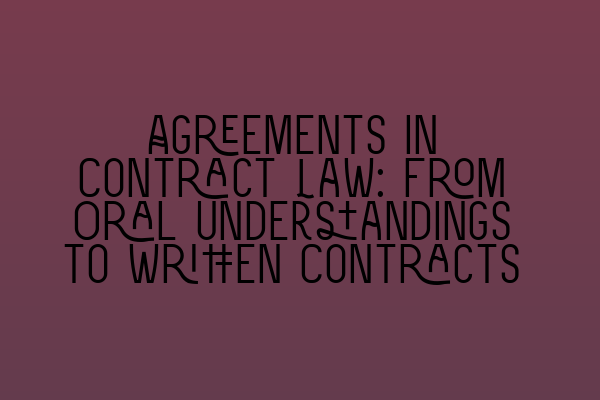Agreements in Contract Law: From Oral Understandings to Written Contracts
In the world of contract law, agreements play a crucial role in establishing the rights and obligations between parties. An agreement, whether oral or written, forms the foundation of a legally binding contract. It is essential to understand the different types of agreements and how they can impact the enforceability of a contract.
An agreement can be made through various means, including oral discussions, written correspondence, or even conduct. While oral agreements may seem informal, they still hold legal significance. However, proving the terms of an oral agreement can be challenging, as it often leads to a “he said, she said” scenario. This is where written agreements shine.
Written contracts provide a clear and tangible record of the agreed-upon terms and conditions between parties. They offer both parties the benefit of certainty and offer better protection against potential disputes. A well-drafted written contract can help avoid misunderstandings and minimize the risk of litigation.
When it comes to enforceability, written contracts are generally preferred in most legal jurisdictions. They help ensure that both parties are on the same page and understand their respective rights and obligations. Additionally, written contracts can help resolve disputes more efficiently, as there is clear evidence of the agreed-upon terms.
To create a legally enforceable written contract, certain elements must be present. These elements include an offer, acceptance, consideration, and the intention to create legal relations. An offer refers to one party expressing a willingness to enter into an agreement, while acceptance signifies the other party’s unconditional agreement to the terms of the offer. Consideration refers to something of value exchanged between the parties, such as money or services, while the intention to create legal relations ensures that the parties intend to be legally bound by the contract.
Creating a well-drafted written contract requires attention to detail and understanding of contract law principles. It is crucial to ensure that all relevant terms and conditions are included, such as payment terms, delivery schedules, warranties, and dispute resolution mechanisms. An experienced contract law solicitor can provide valuable guidance throughout the drafting process, ensuring that the contract is comprehensive, fair, and legally binding.
While written contracts offer significant advantages, it is worth noting that not all agreements need to be in writing to be enforceable. Certain contracts are required by law to be in writing, such as contracts for the sale of land or agreements that cannot be performed within one year. However, most agreements, including those for goods and services, can be oral or written.
When entering into an agreement, it is essential to assess the circumstances and determine whether a written contract is necessary. Assessing the complexity of the transaction, the trustworthiness of the other party, and the potential risks involved can help inform your decision. In high-stakes or complicated situations, it is always advisable to have a written contract to protect your interests.
In conclusion, agreements are an essential component of contract law. Whether oral or written, they establish the rights and obligations between parties. While written contracts provide greater clarity and enforceability, oral agreements can still hold legal weight. It is crucial to assess the circumstances and consult with a contract law solicitor to determine the most appropriate approach for your specific situation.
If you’re preparing for the SQE 1 exam, be sure to check out our practice exam questions and mock tests to help you ace your upcoming test. Need more assistance with SQE 2 preparation? Our comprehensive preparation courses can provide you with the knowledge and skills you need to succeed. Stay up to date with the latest SRA SQE exam dates by visiting our website.
Remember, understanding the complexities of contract law is crucial to protecting your interests and ensuring the enforceability of your agreements. So take the time to familiarize yourself with the principles of contract law and seek professional advice when needed. Happy contracting!
Related Articles:
SQE 1 Practice Exam Questions
SQE 1 Practice Mocks FLK1 FLK2
SQE 2 Preparation Courses
SQE 1 Preparation Courses
SRA SQE Exam Dates
